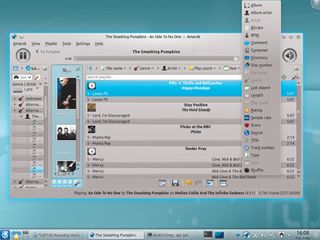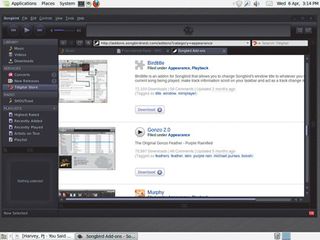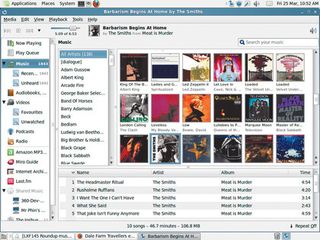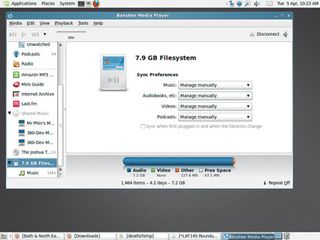Best Linux music player: 5 reviewed and rated
Rhythmbox vs Amarok vs Banshee vs Songbird vs VLC
Online music shops
Back in the day, the only decent online music store was the expensive, DRM-encumbered iTunes. As you'd expect, things have got a lot better since then, and competition has brought us a number of ways to pay for music.
Amarok and Rhythmbox both offer the Jamendo and Magnatune services, giving access to a huge range of work from little-heard artists. You won't find the Radio One playlist in here, but there is an awful lot to enjoy, and you can stream content for free, save music to your hard drive or make a voluntary donation.
Unfortunately, when you click on the Jamendo icon in Rhythmbox it brought so much music into our collection that it crashed the app. VLC handles Jamendo much better, by breaking it into manageable categories.
The best services come from Banshee (with Amazon) and Songbird (with 7digital). Both of these commercial music stores are seamlessly integrated into their respective apps, bringing the music and album artwork into your collection automatically.
7digital also has the honour of providing the back-end for the Ubuntu One music download service, and just shades Amazon in terms of usability for enabling you to listen to short snippets of your prospective purchases in the Songbird interface, rather than in a modified browser, like Amazon does with Banshee. Amazon offers more choice though, so honours are even here.
Verdict
Amarok - 3/5
Rhythmbox - 1/5
VLC - 3/5
Songbird - 5/5
Banshee - 5/5
Internet radio and podcasts
We know there are podcasts and radio streams all over the place, but we want the app to help us find them.
Nul points then to Amarok, which, under the Podcasts icon in the Sources panel, merely invites us to add the RSS or Atom feeds of our favourite podcasts. Rhythmbox isn't much better in this regard, but in Linux Mint it comes with the MintCast feed already added to give you a head start.
Rhythmbox also scores win points by integrating well with LastFM. Once you've signed up to this service and given a few of your favourite artists, LastFM will stream related audio straight into Rhythmbox. Rhythmbox also has a far clearer way of listing streaming radio stations than either Banshee or Amarok.
Banshee's LastFM implementation is poor, but it's great for podcasts. It's integrated with the great Miro website, which aggregates free sound and video recordings that you can add to your media library.
VLC performs well here too, offering a selection of radio streams via Icecast. Its podcast support is no better than that of Amarok though.
For an application built on a web browser, Songbird disappoints. The Shoutcast icon is there but there's no way to browse stations. Songbird enables you to rate the current track, 'love' it or block it from your LastFM stream but sadly we couldn't see an obvious way to actually play LastFM.
Verdict
Amarok - 3/5
Rhythmbox - 4/5
VLC - 4/5
Songbird - 2/5
Banshee - 3/5
Music management

You don't really need much in the way of sorting options to manage a small collection like ours. Some 8GB of music might sound like a lot, but if you have any more than that there are bound to be albums that get lost in the nooks and crannies of your hard drive.
When you take into consideration that one reason for digitising a music collection is convenience, it's clear that the ability to find your songs quickly is of paramount importance.
Bringing up the rear on this front is VLC. If there is a way to organise a playlist, we missed it.
Rhythmbox offers track number, title, genre, artist, album and song duration as filters to order the tracks in a playlist (you can add more from an option in Preferences), as well as a search box. This approach is intuitive, but limited.
You get more control in the main music library view, where you can see the sources panel, plus windows showing genres and artists. This enables you to, for example, select 'Elvis' then 'Jazz' in the relevant windows to get a list of all the Jazz albums by America's answer to Tom Jones.
Banshee is similar to Rhythmbox, but uses windows to let you search by artist and album, with the matching track shown below. The difference is minimal, but we prefer the Rhythmbox approach, because Banshee's cover art view makes it harder to search large numbers of albums.
Songbird goes one better, with three panels to help you limit the number of tracks you're searching through.
Smart playlists
More impressive is that Banshee, Rhythmbox and Songbird have smart playlists, which automatically create playlists based on certain user-defined criteria. For example, they each have a Recently Played playlist. In Songbird this compiles all the audio tracks that you've listened to in the last week, but you can edit the inclusion criteria and change this to whatever you like.
Without doubt the winner here is Amarok. It offers you the ability to search through your playlist by artist, album, year and track name, but also such arcane options as beats per minute, sample rate and when the track was last played.
There are 22 filter options to help you find what you're looking for, and you can perform nested searches, making it easy to find (for example) all your top-rated tracks by Beethoven with a BPM of 127. We know it sounds daft, but you might be a DJ with a love of the classics. You can decide how much or how little information to display to help you find what you're looking for, and there's a search field that you can type into to find tracks.
Verdict
Amarok - 5/5
Rhythmbox - 4/5
VLC - 1/5
Songbird - 4/5
Banshee - 4/5
Plug-ins

Firefox is so popular because of the huge numbers of plugins available for it. From weather applets to terrorist threat level indicators, there's bound to be a plugin out there that adds the functionality you want.
And as Songbird and Firefox are cousins, it should come as no surprise that the Songbird website offers a heap (593 at present) of add-ons to make Songbird better (including an add-on for iPod support - we wonder how much 'missing' functionality is there in the form of a plugin?).
Rhythmbox has 57 plugins, our favourite being Resume On Restart, which does exactly what it says on the tin.
Banshee has 21, including a cover flow implementation that will surely make it into the main release once it's stable enough (it's still an alpha release at the time of writing). But it's not so much sheer numbers that we're looking for as the ease with which the end user can get them.
In this case Amarok excels. A click on Tools > Script Manager > Get More Scripts gives access to loads of radio stations, lyrics apps, a Koran stream and even that emblem of pointlessness the mood bar. Our favourite must be the music quiz, which plays songs and asks you multiple-choice questions about your own collection.
VLC has a similarly clickable addons mechanism, but without the descriptions, ratings and screenshots offered by the Amarok version.
Verdict
Amarok - 5/5
Rhythmbox - 3/5
VLC - 4/5
Songbird - 5/5
Banshee - 3/5
The verdict
All the products we've looked at here have something to offer. Songbird, in particular, must get a mention as a fascinating project. It's no longer being officially supported on the Linux platform, but it's still a great piece of software that deserves some of your time to evaluate it.

Then there's our other wildcard entrant, VLC. If we're ever faced with a file that just won't open, VLC is what we turn to. It runs on OS X and Windows too, downloads in seconds and uses minimal RAM, so if you ever have to use a borrowed machine, you needn't have to put up with the abysmal Windows Media Player hogging your resources.
After that it gets tight at the top. Rhythmbox is winningly usable, but it suffers in comparison with Banshee, which feels just a bit more polished in just about every respect. Banshee is written in Mono, the open source implementation of Microsoft's C# language, so if you're concerned about the implied patent threat of using that, you're better off with Rhythmbox.
The lupine factor
The one application that we can't make our mind up about is Amarok. If you have a vast music collection that you need to manage in convoluted ways that mere mortals can't imagine, it's probably the right choice for you. Amarok can do everything that the other apps here can do, but it's blighted by a terrible interface that turns simple tasks into a maze of guesswork and trial and error.
However, we're guessing that the only serious disadvantage that this offers is a steepening of the learning curve. Those with the patience will find it full of music processing power.

That just leaves Banshee. The Boycott Novell brigade won't like it, but it's our favourite by a mile. Thanks to Gstreamer's unfree repository it can play all the naughty but convenient file formats, it works perfectly with Amazon, it looks good, and it's the easiest application to use.
Banshee is also the one application that uses the brilliant Miro podcast guide, opening up a world of free online learning/gibberish about ponies. Ubuntu's switch from Rhythmbox to Banshee will bring it lots of new users, and deservedly so.
1st - Banshee - 5/5
Web: http://banshee.fm Licence: MIT/X11 Version: 1.8
Banshee doesn't do much more than the others, but it makes it so easy
2nd - Rhythmbox - 4/5
Web: www.rhythmbox.org Licence: GPL Version: 0.13.3
While still a great app, Rhythmbox loses out because of a lack of polish.
3rd - Amarok - 3/5
Web: www.amarok.kde.org Licence: GPL Version: 2.4.1 beta 1
Lots of power to organise your music, but a headache to learn to use.
4th - Songbird - 3/5
Web: www.getsongbird.com Licence: GPL Version: 1.7.2
Best for those with short attention spans who love shiny things.
Get daily insight, inspiration and deals in your inbox
Get the hottest deals available in your inbox plus news, reviews, opinion, analysis and more from the TechRadar team.
